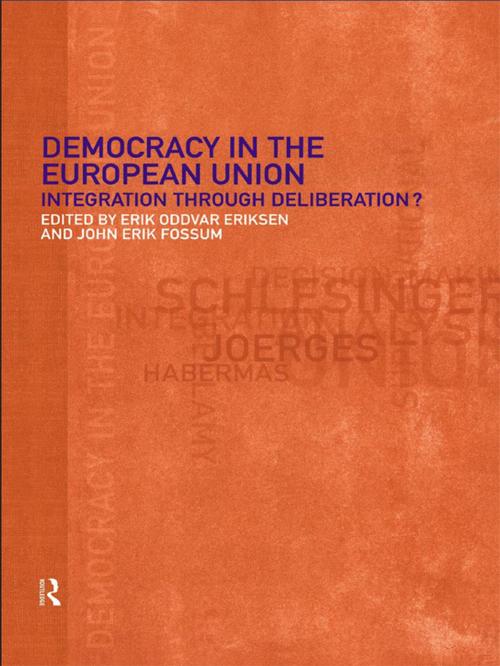Democracy in the European Union
Integration Through Deliberation?
Nonfiction, Social & Cultural Studies, Political Science| Author: | ISBN: | 9781134589920 | |
| Publisher: | Taylor and Francis | Publication: | September 11, 2002 |
| Imprint: | Routledge | Language: | English |
| Author: | |
| ISBN: | 9781134589920 |
| Publisher: | Taylor and Francis |
| Publication: | September 11, 2002 |
| Imprint: | Routledge |
| Language: | English |
The European Union is widely held to suffer from a democratic deficit, and this raises a wider question: can democracy at all be applied to decision-making bodies beyond the nation state? Today, the EU is a highly complex entity undergoing profound changes. This book asks how the type of cooperation that the EU is based on can be explained; what are the integrative forces in the EU and how can integration at a supra-national level come about?
The key thinkers represented in this volume stress that in order to understand integration beyond the nation state, we need new explanatory categories associated with deliberation because a supranational entity as the EU posesses far weaker and less well-developed means of coercion - bargaining resources - than do states. The most appropriate term to denote this is the notion of 'deliberative supranationalism'. This pioneering work, headed by major writers such as Habermas, Schlesinger and Bellamy, brings a new perspective to this key issue in contemporary politics and political theory.
The European Union is widely held to suffer from a democratic deficit, and this raises a wider question: can democracy at all be applied to decision-making bodies beyond the nation state? Today, the EU is a highly complex entity undergoing profound changes. This book asks how the type of cooperation that the EU is based on can be explained; what are the integrative forces in the EU and how can integration at a supra-national level come about?
The key thinkers represented in this volume stress that in order to understand integration beyond the nation state, we need new explanatory categories associated with deliberation because a supranational entity as the EU posesses far weaker and less well-developed means of coercion - bargaining resources - than do states. The most appropriate term to denote this is the notion of 'deliberative supranationalism'. This pioneering work, headed by major writers such as Habermas, Schlesinger and Bellamy, brings a new perspective to this key issue in contemporary politics and political theory.















